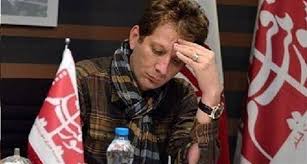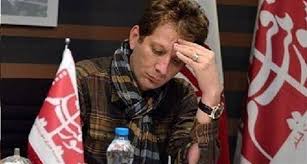
After being accused of fraudulently pocketing $2.8 billion and after a lengthy trial process, Iran's billionaire tycoon Babak Zanjani has been sentenced to death for corruption, a judicial official said Sunday.
Despite financial sanctions imposed on the Islamic republic's banks as punishment for its nuclear programme, Zanjani became notoriously known for finding ways to channel hard currency from oil sales to Tehran during the era of president Mahmoud Ahmadinejad.
Judiciary spokesman Gholam Hossein Mohseni-Ejeie said at his weekly press conference that the 41-year-old was convicted of fraud and economic crimes and as well as facing the death penalty he must repay money to the state.
Two other accused were also convicted of "corruption on earth", the most serious offence under the country's criminal code, meaning they too will face the death penalty, in a trial that was held in public, a rarity for such a major case in Iran.
"The preliminary court has sentenced these three defendants to be executed, as well as paying restitution to the plaintiff," Mohseni-Ejeie said, adding that that was the oil ministry.
Without specifying the sum, the spokesman said, the convicted must also pay a "fine equal to one fourth of the money that was laundered".
Insisting that the only reason the money had not been paid to the oil ministry was that sanctions had prevented a planned transfer from taking place, Zanjani, who can appeal, had denied any wrongdoing.
While other trials are going on, the case follows repeated declarations from the current government of President Hassan Rouhani that corruption and the payment of illegal commissions thrived under Ahmadinejad's rule.
In return for commissions paid by Ahmadinejad's government he was tasked with circumventing sanctions to get money back to Iran, Zanjani had repeatedly said in media interviews.
Hitting out at the use of middlemen such as Zanjani, who before being arrested had boasted of his personal wealth Rouhani's oil minister Bijan Zanganeh signalled the shifting political balance in Iran in October last year.
Iranian media have put it as high as $13.5 billion.
Zanganeh had urged investors to deal directly with his ministry and avoid third parties while speaking after Iran concluded a nuclear deal with world powers, paving the way for increased foreign activity in Iran's oil sector.
"We despise the corrupt parasites that want to suck the nation's blood even in this situation. I recommend foreign companies stay away from these corrupt individuals, who know nothing but deceitfulness," Zanganeh said, to loud applause at an oil and energy industry event in the capital while Zanjani's trial was under way.
"They will tell you that until you give us our commission you can't get your work done. Don't believe them," Zanganeh said.
Zanjani was among Iranian individuals blacklisted under US and European sanctions.
(Source:www.theguardian.com & www.ndtv.com)
Despite financial sanctions imposed on the Islamic republic's banks as punishment for its nuclear programme, Zanjani became notoriously known for finding ways to channel hard currency from oil sales to Tehran during the era of president Mahmoud Ahmadinejad.
Judiciary spokesman Gholam Hossein Mohseni-Ejeie said at his weekly press conference that the 41-year-old was convicted of fraud and economic crimes and as well as facing the death penalty he must repay money to the state.
Two other accused were also convicted of "corruption on earth", the most serious offence under the country's criminal code, meaning they too will face the death penalty, in a trial that was held in public, a rarity for such a major case in Iran.
"The preliminary court has sentenced these three defendants to be executed, as well as paying restitution to the plaintiff," Mohseni-Ejeie said, adding that that was the oil ministry.
Without specifying the sum, the spokesman said, the convicted must also pay a "fine equal to one fourth of the money that was laundered".
Insisting that the only reason the money had not been paid to the oil ministry was that sanctions had prevented a planned transfer from taking place, Zanjani, who can appeal, had denied any wrongdoing.
While other trials are going on, the case follows repeated declarations from the current government of President Hassan Rouhani that corruption and the payment of illegal commissions thrived under Ahmadinejad's rule.
In return for commissions paid by Ahmadinejad's government he was tasked with circumventing sanctions to get money back to Iran, Zanjani had repeatedly said in media interviews.
Hitting out at the use of middlemen such as Zanjani, who before being arrested had boasted of his personal wealth Rouhani's oil minister Bijan Zanganeh signalled the shifting political balance in Iran in October last year.
Iranian media have put it as high as $13.5 billion.
Zanganeh had urged investors to deal directly with his ministry and avoid third parties while speaking after Iran concluded a nuclear deal with world powers, paving the way for increased foreign activity in Iran's oil sector.
"We despise the corrupt parasites that want to suck the nation's blood even in this situation. I recommend foreign companies stay away from these corrupt individuals, who know nothing but deceitfulness," Zanganeh said, to loud applause at an oil and energy industry event in the capital while Zanjani's trial was under way.
"They will tell you that until you give us our commission you can't get your work done. Don't believe them," Zanganeh said.
Zanjani was among Iranian individuals blacklisted under US and European sanctions.
(Source:www.theguardian.com & www.ndtv.com)





